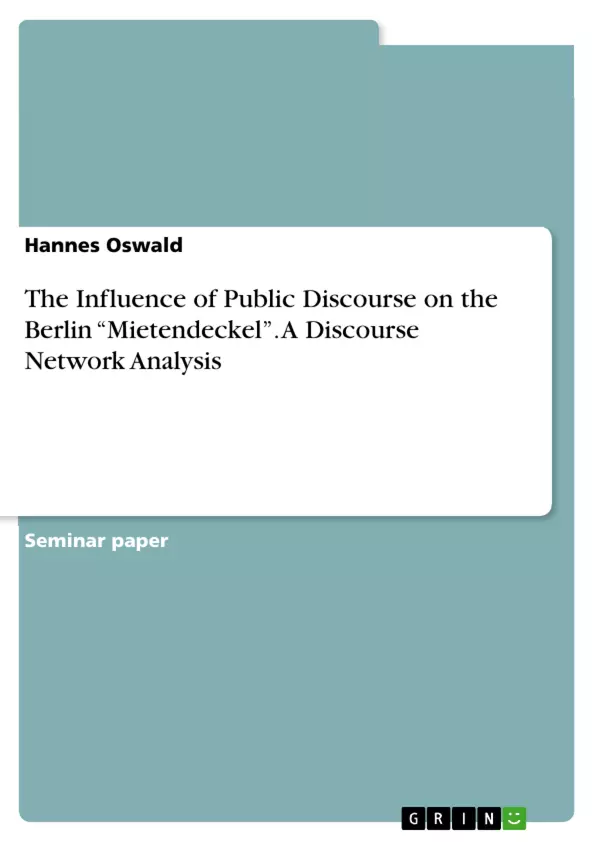This paper examines the political discourse surrounding the "Berliner Mietendeckel". The rent cap, which was supposed to freeze rents in Berlin for five years, was passed by the left-wing Red-Red-Green Senate in January 2020 and overturned by the Federal Constitutional Court just four months after it came into effect. How did the controversial law pass despite opposition from local opposition parties, the real estate and construction industries, and the federal government? And to what extent did the media discourse subsequently condition the final court's decision to return to the previous status quo? These questions will be pursued by systematically extracting actors and statements from articles published in the Süddeutsche Zeitung and examining networks using the Discourse Network Analyzer program.
On the theoretical basis of the Advocacy Coalition Framework, it is found that the pro-law coalition did not have the necessary superiority in the political discourse to be able to maintain a long-term policy change. While the small but effective network of local political supporters was able to push the law through the Senate, the opposition coalition was overall more broadly aligned and internally better connected. It can be argued that increasing nationwide media attention to the Berlin rent cap increasingly shifted discursive relations in favor of the law's opponents, ultimately resulting in a return to the status quo before the law. The finding also underscores the importance of institutional veto players in preventing policy change on social policy issues.
Table of Contents
- Introduction
- Advocacy Coalitions, Discursive Networks and Policy Change
- Advocacy Coalition Framework
- Research Design
- Discourse Network Analysis
- Data and Data Collection
- Coding and Visualization
- Findings
- Discussion
- Limitations and future research
- References
Objectives and Key Themes
This paper examines the political discourse surrounding the "Berliner Mietendeckel" (Berlin Rent Cap), which was passed by the left-wing Senate in 2020 and overturned by the Federal Constitutional Court. The paper explores how the law passed despite opposition and the extent to which the media discourse influenced the court's decision. Using Discourse Network Analysis, the paper examines the networks of actors and statements from articles published in the Süddeutsche Zeitung to understand the dynamics of the policy change.
- The impact of public discourse on policy change, specifically the Berlin Rent Cap.
- The role of advocacy coalitions in shaping policy outcomes.
- The influence of media coverage and public opinion on legal and political decisions.
- The effectiveness of rent regulation in addressing housing affordability.
- The limitations of state-level policy intervention in a federal system.
Chapter Summaries
The paper begins with an introduction, outlining the research questions and the context of the "Berliner Mietendeckel" (Berlin Rent Cap). It highlights the rising rent prices in Berlin and the rationale behind the rent cap legislation. The paper then discusses the advocacy coalition framework, providing a theoretical lens to analyze the political discourse surrounding the rent cap. The research design is presented, explaining the methodology of Discourse Network Analysis (DNA) and the data collected from the Süddeutsche Zeitung. The subsequent chapter presents findings from the DNA analysis, focusing on the networks of actors and statements during two time periods: before and after the rent cap's passage. The final chapter discusses the implications of the findings, highlighting the role of media discourse, institutional veto players, and the limitations of policy change.
Keywords
The paper focuses on the key concepts of public discourse, advocacy coalitions, policy change, discourse network analysis, the "Berliner Mietendeckel" (Berlin Rent Cap), and the Federal Constitutional Court. It further explores the importance of media coverage, political networks, and the influence of institutional veto players in shaping policy outcomes. This analysis is grounded in the theoretical framework of the Advocacy Coalition Framework.
Frequently Asked Questions
What was the purpose of the Berlin Rent Cap (Mietendeckel)?
The rent cap was intended to freeze rents in Berlin for five years to address rapidly rising housing costs and protect tenants.
Why was the Berlin Rent Cap overturned?
The Federal Constitutional Court ruled that the state of Berlin did not have the legislative authority to pass such a law, as rent regulation falls under federal jurisdiction.
What is Discourse Network Analysis (DNA)?
DNA is a methodology used to systematically extract actors and their statements from media (like Süddeutsche Zeitung) to visualize political networks and power shifts.
How did media discourse influence the rent cap decision?
The paper argues that increasing nationwide media attention shifted the discursive balance in favor of opponents, making it harder for the pro-law coalition to sustain the policy change.
What is the Advocacy Coalition Framework?
It is a theoretical framework used to analyze how groups of actors with shared beliefs (coalitions) compete to influence policy outcomes over time.
- Quote paper
- Hannes Oswald (Author), 2022, The Influence of Public Discourse on the Berlin “Mietendeckel”. A Discourse Network Analysis, Munich, GRIN Verlag, https://www.hausarbeiten.de/document/1321822


